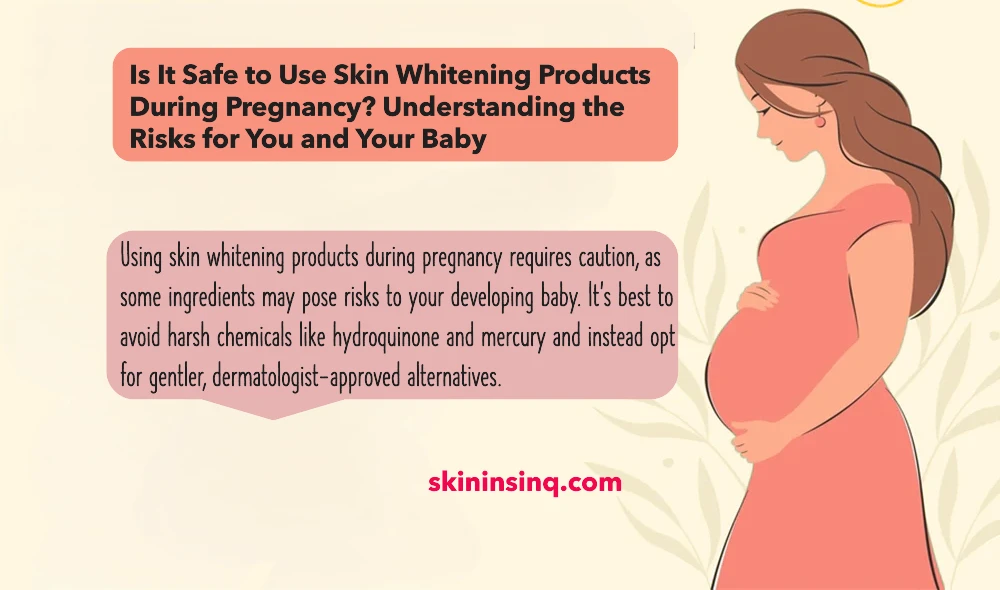Is It Safe to Use Skin Whitening Products During Pregnancy? Understanding the Risks for You and Your Baby
Is It Safe to Use Skin Whitening Products During Pregnancy? Understanding the Risks for You and Your Baby
Pregnancy brings about numerous changes in a woman’s body, including fluctuations in hormones that often affect the skin. Conditions such as melasma, also known as the "mask of pregnancy," are common and may prompt many expectant mothers to consider skin whitening products to maintain an even skin tone. However, safety becomes a top priority during pregnancy, and not all skincare ingredients are considered safe for use during this delicate time. So, is it safe to use skin whitening products during pregnancy? The answer largely depends on the ingredients involved.
Ingredients to Avoid in Whitening Products During Pregnancy
Many over-the-counter and prescription whitening creams contain strong active ingredients that can pose potential risks to both mother and baby. Here are a few commonly used agents that should be approached with caution or avoided altogether during pregnancy:
-
Hydroquinone
This is one of the most commonly used ingredients in skin lightening products. While no direct link has been proven between hydroquinone and fetal harm, studies show that it has a high absorption rate (35–45%) through the skin, making it more likely to reach the bloodstream. Due to this high systemic absorption, most health professionals recommend avoiding hydroquinone during pregnancy as a precaution. -
Mercury Compounds
Some unregulated skin whitening products, especially those sold online or in certain countries, may contain mercury, which is extremely dangerous during pregnancy. Mercury exposure can affect fetal brain development and is toxic even in small amounts. Always check product labels and buy from reputable sources. -
Retinoids (Tretinoin, Retinol, Retinyl Palmitate)
Although not primarily used for whitening, retinoids are often included in anti-aging or brightening creams. Oral retinoids are known teratogens, and topical retinoids are not recommended during pregnancy due to possible risks of birth defects.
Safer Alternatives During Pregnancy
If you’re looking to manage hyperpigmentation or brighten your skin during pregnancy, consider these pregnancy-safe ingredients:
-
Vitamin C (Ascorbic Acid): A powerful antioxidant that helps brighten skin and fade pigmentation with minimal risk.
-
Niacinamide (Vitamin B3): Effective at improving skin tone and reducing discoloration while being gentle and safe.
-
Azelaic Acid: Often used to treat acne and melasma, azelaic acid is considered safe during pregnancy and can help lighten dark patches.
-
Licorice Root Extract: A natural ingredient that inhibits melanin production and is generally safe for pregnant women.
-
Kojic Acid: Though used with caution, low concentrations of kojic acid may be acceptable during pregnancy—always consult your healthcare provider first.
General Safety Tips
-
Always consult a dermatologist or obstetrician before starting any new skincare products during pregnancy.
-
Choose fragrance-free and hypoallergenic formulations to minimize skin sensitivity.
-
Use a broad-spectrum sunscreen daily, as UV exposure can worsen pigmentation and melasma.
-
Perform a patch test before trying any new product to avoid unexpected reactions.
Conclusion
Using skin whitening products during pregnancy requires caution, as some ingredients may pose risks to your developing baby. It’s best to avoid harsh chemicals like hydroquinone and mercury and instead opt for gentler, dermatologist-approved alternatives. Focusing on safe skincare and sun protection can help you maintain healthy, radiant skin throughout pregnancy without compromising your health or your baby’s well-being.

Related Blog
What Causes Oily Skin and Can It Be Managed Naturally? Exploring Root Causes and Gentle Solutions
Aug 2, 2025 by Admin
General
What Are the Signs That You Have Sensitive Skin? Key Symptoms to Help You Identify This Delicate Skin Type
Aug 1, 2025 by Admin
General